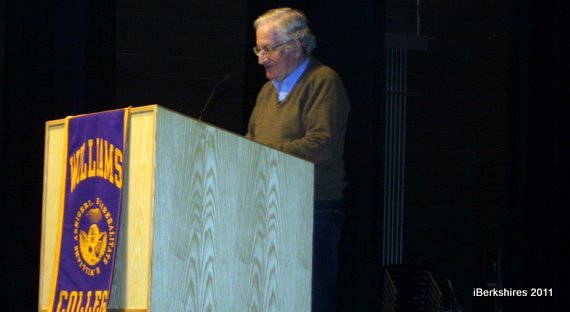Chomsky at Williams

Noam Chomsky Questions Humanitarian Intervention At Williams
By Andy McKeeveriBerkshires Staff
10:33PM / Saturday, September 17, 2011
WILLIAMSTOWN, Mass. — Controversial linguist and political pundit Noam Chomsky told Williams College students to question if humanitarian intervention even exists.
The Massachusetts Institute of Technology professor weaved through the history, as he is known to do in his books criticizing U.S. Foreign Policy, of humanitarian intervention to make the point that those actions are not simple and come with a huge amount of politics while simple things that could truly save lives are overlooked.
Chomsky started with the 1850s with John Stuart Mill posing the idea that England should intervene not only when its safety and interest are in danger but because it is dedicated to peace. Philosophers added to the growing thought - painting a "saintly glow" of modernized countries - by saying "barbarians" needed protection from the civilized power.
While the ideas may have begun then, it wasn't until after the Cold War when the idea began to pick up momentum. When the Soviet Union fell, NATO - against handshake agreements with Mikhail Gorbachev - expanded to the entire world.
"The condition was that NATO does not expand one inch to the east. That meant east of Germany. NATO immediately moved east of Germany and then further east," Chomsky said. "These were only gentleman's agreement.. He was stupid enough to believe western diplomats."
NATO continued to expand and became a "global, U.S. run intervention" organization and with that the U.S. also shifted their foreign policy, Chomsky said. Former President George H. Bush continued to keep a large military presence to ensure global safety by keeping an eye on the Middle East.
"It wasn't because of the Russians, it was because of the technological sophistication of third world powers," Chomsky said. "There was an ideological change too, a large, sudden interest in the concept of humanitarian intervention."
In 1999 the "crown" of humanitarian intervention came with the bombing of Serbia. In what sometimes considered NATO's first humanitarian intervention, the goal was the end ethnic cleansing of Kosovo Albanians. When most of the world condemned the move humanitarian intervention took another turn, he said.
"At that point a new concept was invented. That was called the responsibility to protect," Chomsky said but added there were two versions.
The version that was adopted by the rest of the world, including the countries that condemned the Kosovo action, did not include a stipulation that the western world took. When western cultures point to the responsibility to protect and say it was supported by the rest of the world, that is not entirely correct, Chomsky contends.
"It provides for NATO and NATO alone to intervene freely anywhere without authorization from the Security Council," Chomsky said. "There is only one region that can do this... The one regional group that can do that is NATO and the region of their authority is the world."
While Kosovo is often considered the first humanitarian intervention, Chomsky contends that there are many other world actions that should also be considered but had fallen of the radar.
 |
"They all had the properties of humanitarian intervention," Chomsky said. "They meant it."
Also left out of consideration, Chomsky contends, is India's intervention of East Pakistan to end Pakistani atrocities and Vietnam's invasion of Cambodia that ended Pol Pot's reign.
"Neither of these figures in the literature of humanitarian intervention because of two reasons. One reason is, wrong agency. They did it. We didn't do it. The second and more powerful reason is the U.S. was bitterly opposed to both of these interventions," Chomsky said. "There are cases where intervention has had benevolent effects."
But with all the political jargon and political forces that have changed humanitarian intervention throughout history, six million infants die every year in countries that lack the ability to perform simple medical procedures that would cost very little to the wealthiest nations, Chomsky said. With on a "tiny percentage of the GDP" from the largest nations the most elementary form of humanitarian intervention could save six million, he said.
Chomsky appeared at Williams as the first part of a two-part dialogue about the dilemmas in humanitarian intervention. Fiona Terry will be the next speaker on Tuesday, Oct. 18, at 8 p.m., also at the '62 Center.
Noam Chomsky has written and lectured widely on linguistics, philosophy, intellectual history, contemporary issues, international affairs and U.S. foreign policy. He is currently Institute Professor of Linguistics and Philosophy at M.I.T. This talk is sponsored by the Class of '71 Public Affairs Forum and is the first of a two-part dialogue on Humanitarian Intervention (see also Fiona Terry, Oct. 18). The event is free, but tickets are required. Book signing to follow.
Note: This event is currently sold out. We are no longer taking names for the wait list. A wait line will open at 6 pm on Sept 15 in the CTD lobby. Any tickets not picked up by 6:50 pm will be released at that time. This event will also be taped for airing on Williams YouTube the following week.
http://www.youtube.com/user/WilliamsCollege#p/search
 Stumble It!
Stumble It!


0 Comments:
Post a Comment
<< Home